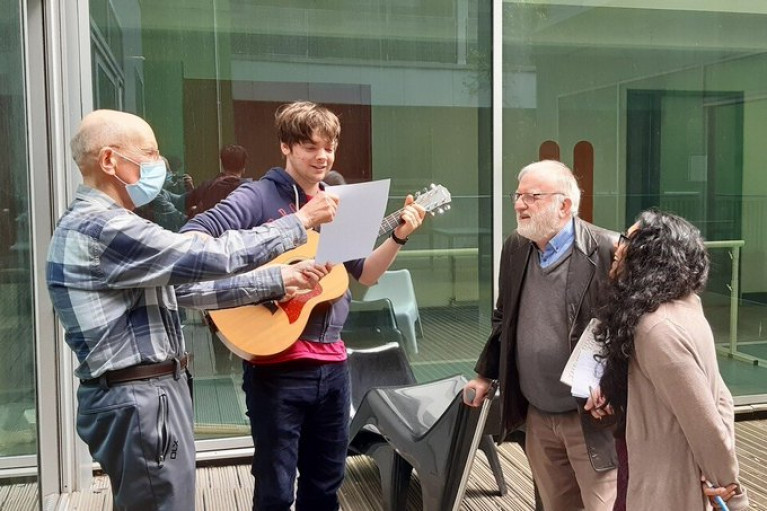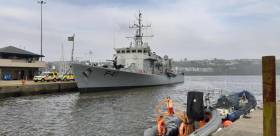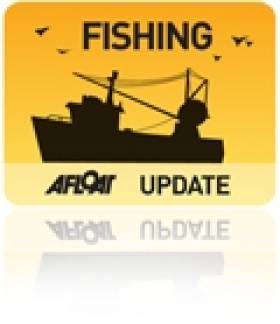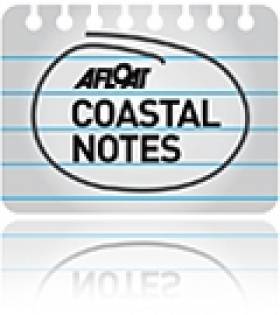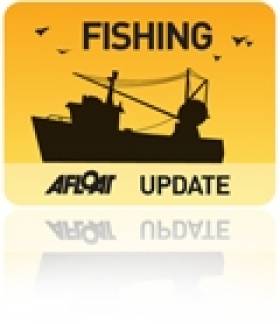Displaying items by tag: communities
At the Liffey Trust Studios, a handful of people file into the multi-purpose community space behind the Point Village.
They climb two flights of stairs and enter a waiting area where they are greeted by the voice of an aerobics instructor barking orders in sync with a Lady Gaga remix.
Everyone not kitted out in fitness gear has come equipped with either a notepad, photographs or a guitar. They are old and young, choir singers, musical theatre aficionados, and former Dublin Port dock workers.
All have a mutual interest in the Docklands and all have the intention, before the day is out, to write a song about the area.
Before these Sing a Song of Docklands workshops, few had any experience of songwriting.
“It’s so different to what I normally do,” says Declan Byrne, a former dockworker. “I’m trying to get a message, a positive message across. That’s what I’m about.”
Byrne had submitted fresh lyrics ahead of what would be the third of four workshops.
Titled “Dublin Docker, No More to be Seen”, its opening verse reads:
“We were never known for being quiet/ But the picture painted is not quite right/ Drinkers, strokers, smugglers and robbers/ Fails to capture our way of life.”
For much more Dublin Inquirer delves into the past of the local dockland communities.
#coastalnotes - Communities along the coast reports Independent.ie have been warned that local intelligence is critical if Ireland is to win the battle against drug-smuggling gangs.
Gardaí, Customs and Excise, and the Naval Service urged people suspicious of any activities at sea or along isolated stretches of coastline to immediately contact the authorities.
The plea came as the Cork West Garda Division staged a 'Coastal Watch' seminar in Kinsale.
Fittingly, the seminar took place in west Cork, where some of Ireland's biggest drug seizures have been made, including the infamous €440m cocaine smuggling bid at Dunlough Bay in July 2007.
For more on the story click here.
Afloat adds also berthed in Kinsale was a Revenue Commissioners Customs cutter. In addition but not related to the seminar was a visiting €5m private motor superyacht Capella C which was converted from a pilot cutter vessel.
Back to the Future for European Fish Week
World Oceans Day on 8 June will see the launch European Fish Week 2011 at Trinity College's Long Room Hub.
The evening will comprise an exhibition and brief talk on this year's theme of 'Back to the Future' - reclaiming the past richness of Ireland's seas and fishing communities.
"By reminding ourselves of how living with the sea used to be, we can better understand the present extent of overfishing and how we can play a part in ending it through an effective reform of the Common Fisheries Policy," according to organisers OCEAN2012.
The event, which will also feature music and a reception, begins at 6pm on 8 June at the Long Room Hub in Trinity College, Dublin 2. Those wishing to attend should RSVP to [email protected] by 3 June.
Further events will be taking place throughout Europe from 4-12 June. For more information visit ocean2012.eu.
Campaigners Call on Govt to Back Aarhus Convention
Grassroots campaigners have called on the Government to ratify a UN convention on public access to decision-making on environmental issues.
According to The Irish Times, activists at the first All-Ireland Community Campaigns Gathering in Dublin recently claimed that coastal communities would have been “spared a decade of distress” if the Aarhus convention had been adopted into Irish law.
Ireland is one of just a handful of European countries yet to ratify the Aarhus convention, first adopted in 1998. Former Environment Minister John Gormley left office before fulfilling his promise to do so.
Mamie Bowen of the Cork Harbour Alliance for a Safe Environment (Chase) cited the approval of a foreshore licence for the Corrib gas pipeline, despite local concerns, as an example of the Government allowing private companies to "impose dangerous projects on communities.”
The common-cause gathering was attended by community activists from Cork, Derry, Donegal, Dublin, Kerry, Limerick, Mayo and Tyrone.
The Irish Times has more on the story HERE.
Coveney to Focus on Future of Coastal Communities
The meeting focused on the key areas of importance to both countries in the Common Fisheries Policy. Minister Coveney said "I consider that the Reform of the CFP to be absolutely crucial to the future of the Irish fishing industry and I am committed to working to deliver a reform package that works for Irish fishermen and also ensures that fish stocks are rebuilt and are managed in a sustainable way. Coastal communities are directly dependent on a healthy fishing industry and the new CFP must deliver long term economic activity and employment for these communities. My experience to date in public life has reinforced the importance of building trust and a positive relationship with key decision makers. My relationship with the Spanish Minister with responsibility for fisheries is important in that regard. Today was an important first step in that relationship".
Minister Coveney and Minister Rosa Aguilar agreed to focus on key elements of the CFP Reform and to develop a mutual understanding in advance of key negotiations later this year. A joint statement on the areas of mutual interest that were discussed is attached. Minister Coveney said "While there are certain areas where Ireland and Spain have opposing positions, particularly in relation to access to fish stocks, there are many areas where both countries have similar concerns. Both countries have coastal communities very dependent on fishing and related activities and the new CFP must be reformed to work positively in the long term to support these communities".
Minister Coveney added "The development of mutual understanding on core issues including effectively addressing discards, will be critical in the negotiations. I am also convinced that the consumer must be given clear information on the origin and production methods of fish in order to be able to make an informed choice. This approach will, I firmly believe, benefit EU fishermen and aquaculture operators who operate under strict environmental and food safety rules. I am seeking to reform the CFP in the area of governance so that stakeholders are given a key input into management arrangements that are developed on a regional basis. Both Minister Rosa Aguilar and myself are convinced of the importance of increased EU funding to support the reformed CFP.
I will be consulting closely with the Irish fishing industry and other stakeholders over the coming weeks so that I have a full understanding of all the issues. We have the opportunity now to deliver real reforms and I consider that we must work closely with other Member States on areas of mutual interest and importance to develop a policy that ensures that there is a future for Irish fishermen and coastal communities".
Programme for Government will Reinstate Marine Department
It maybe the second last item on the programme for government issued by Enda Kenny and Eamon Gilmore yesterday but the indications are good that the marine sector will see a reinstated Department of the Marine. the Fine Gael and Labour coalition say 'marine responsibilities will be merged under one Department, for better co-ordination in policy delivery'. Here is the relevant excerpt:
Coastal communities, fisheries & marine environment
We will negotiate the best possible deal for fishermen in the review of the Common Fisheries Policy.
We will support the development of sustainable aquaculture and fish farms by streamlining the licensing process and reducing associated bureaucracy.
Marine responsibilities will be merged under one Department, for better co-ordination in policy delivery. We will develop an integrated marine and coastal planning process in order to maximise the potential of Ireland's coastline in fishing, aquaculture, ocean energy and tourism.
A Sea Fisheries Sustainability Impact Assessment, based on consultation with all major stakeholders, will be brought before the Dáil annually before EU fisheries negotiations commence.
We will replace criminal sanctions system for minor fisheries offences with administrative sanction system to bring Ireland into line with other European jurisdictions. Safety at sea and decent working conditions must underpin the development of the fisheries sector. We will explore the provision of an emergency towing vessel for the Coastguard.


























